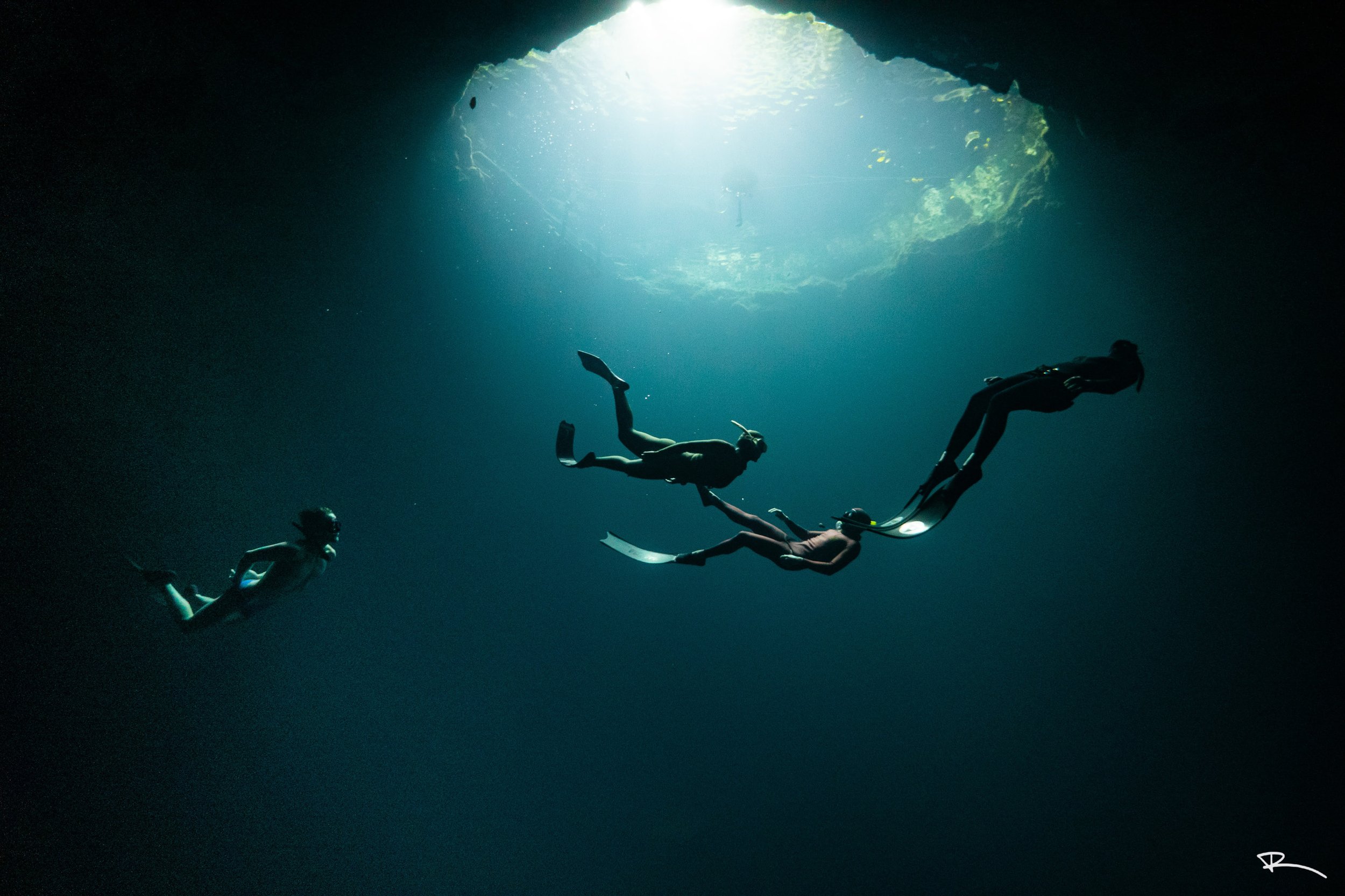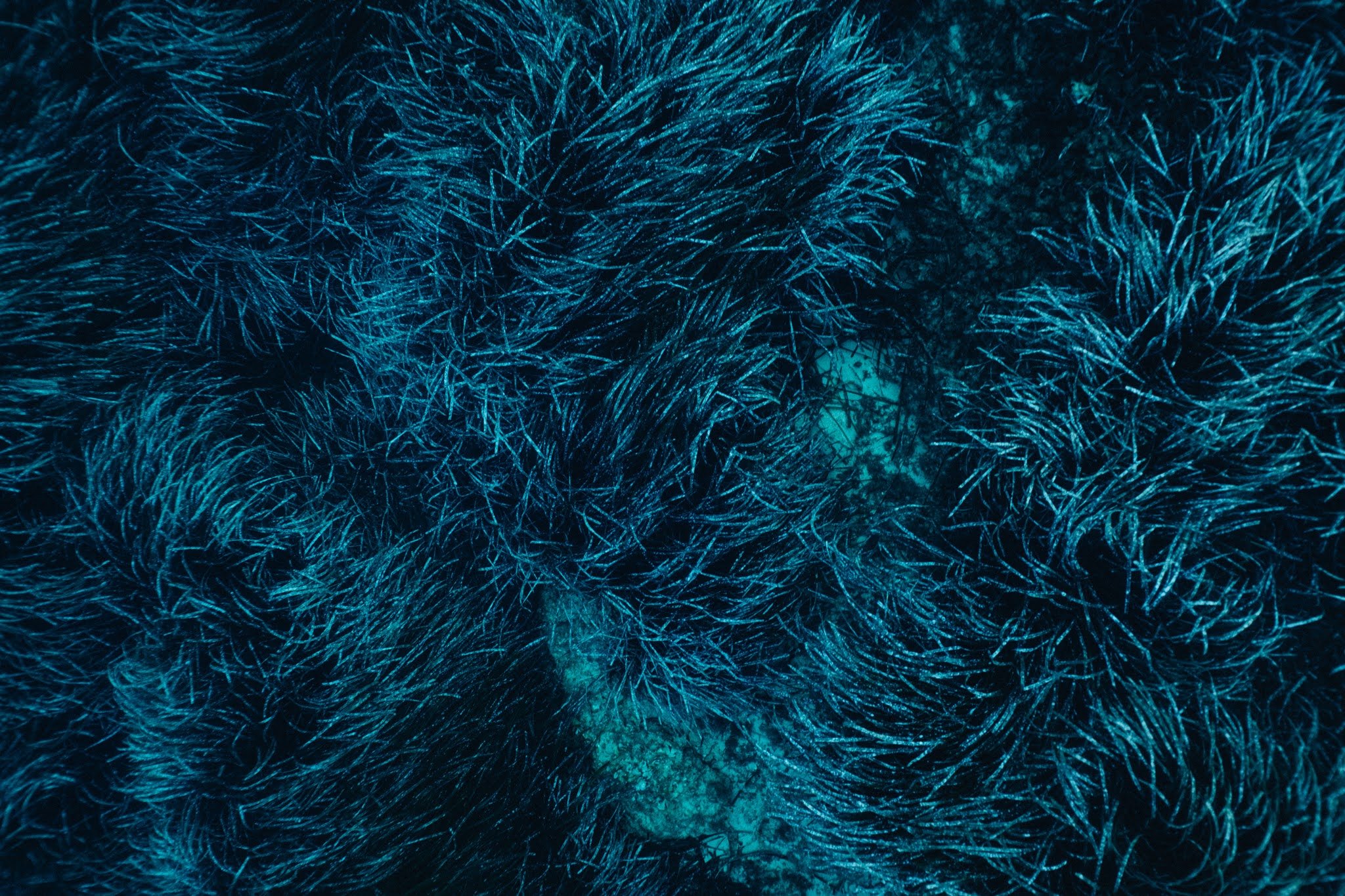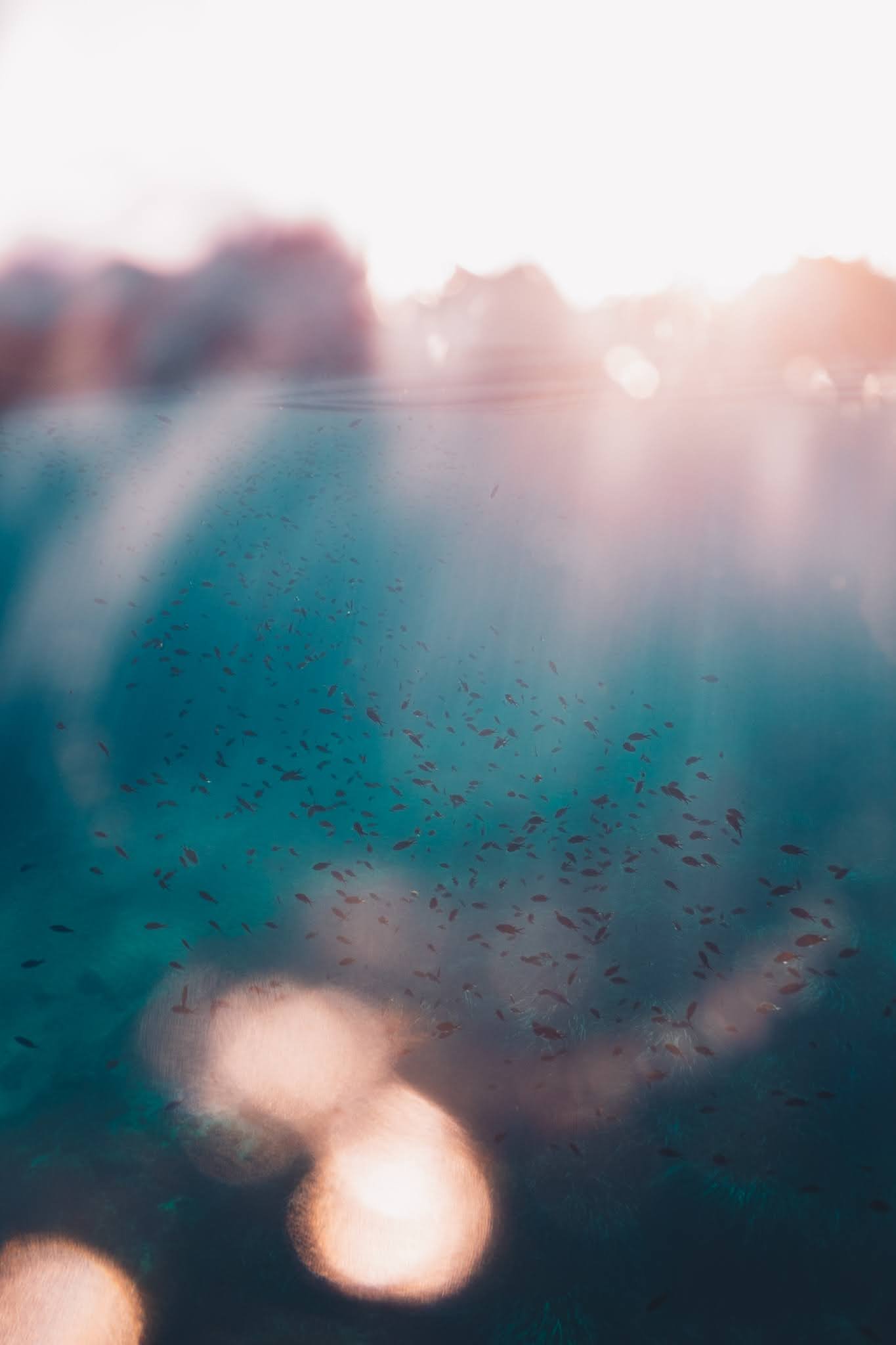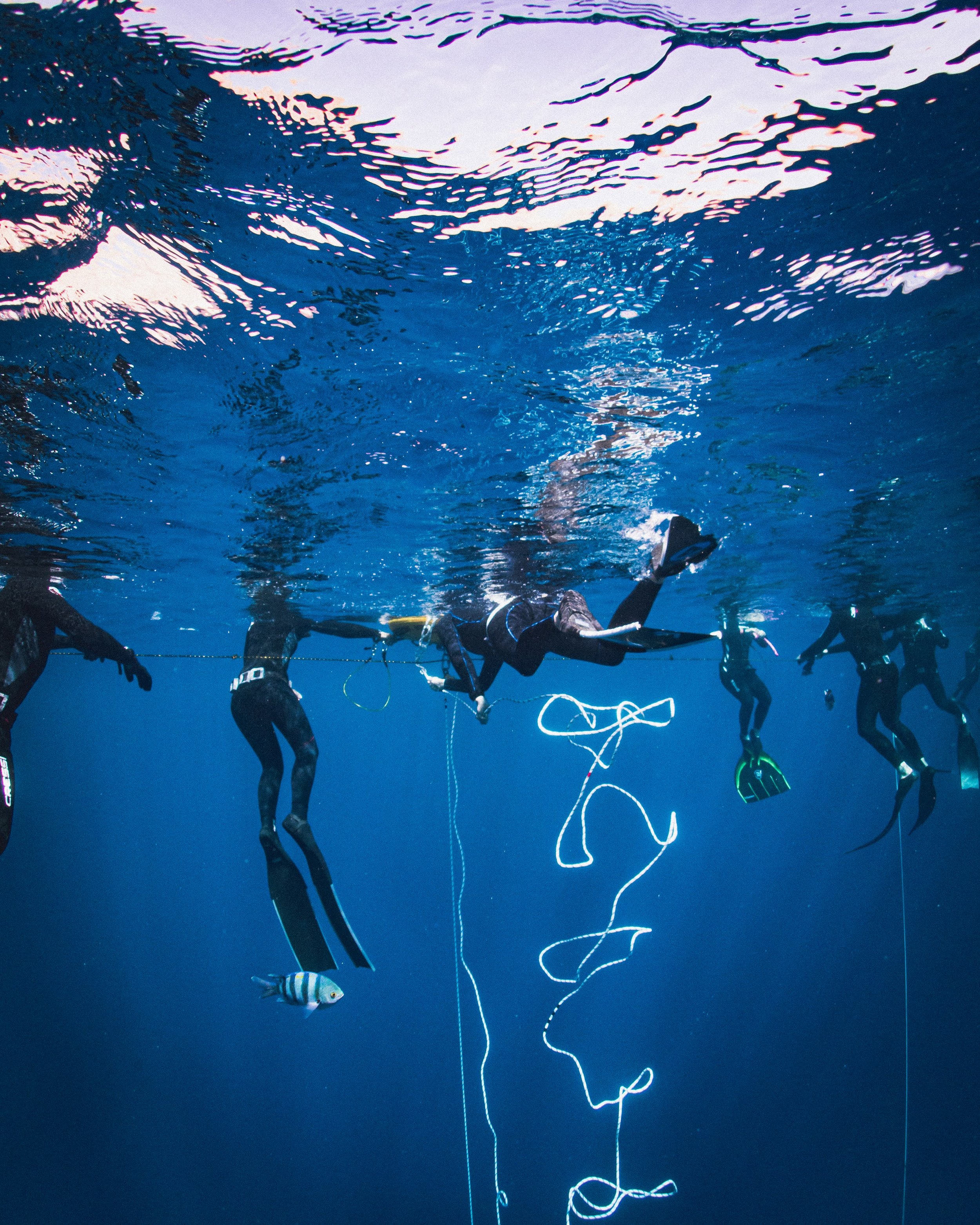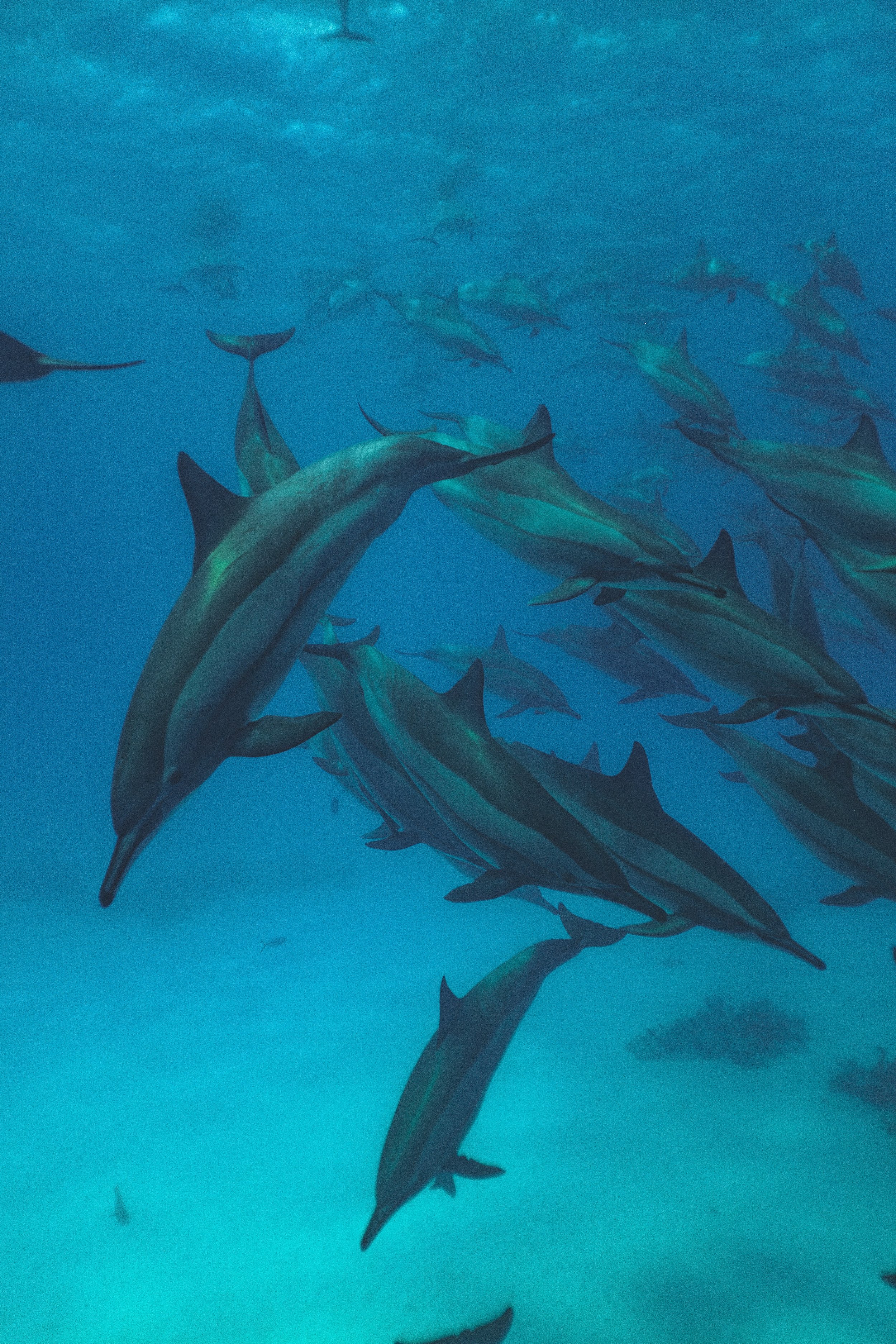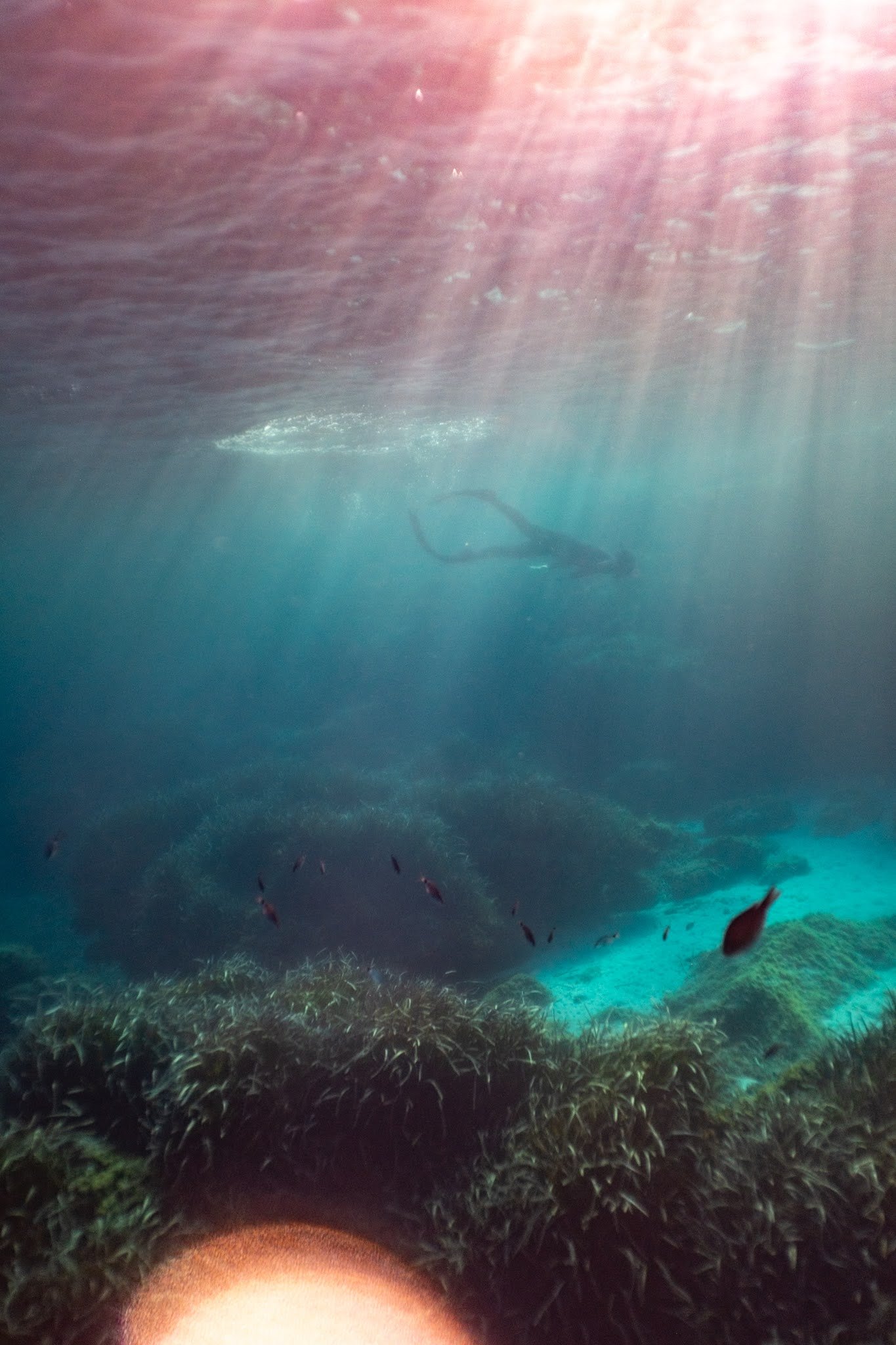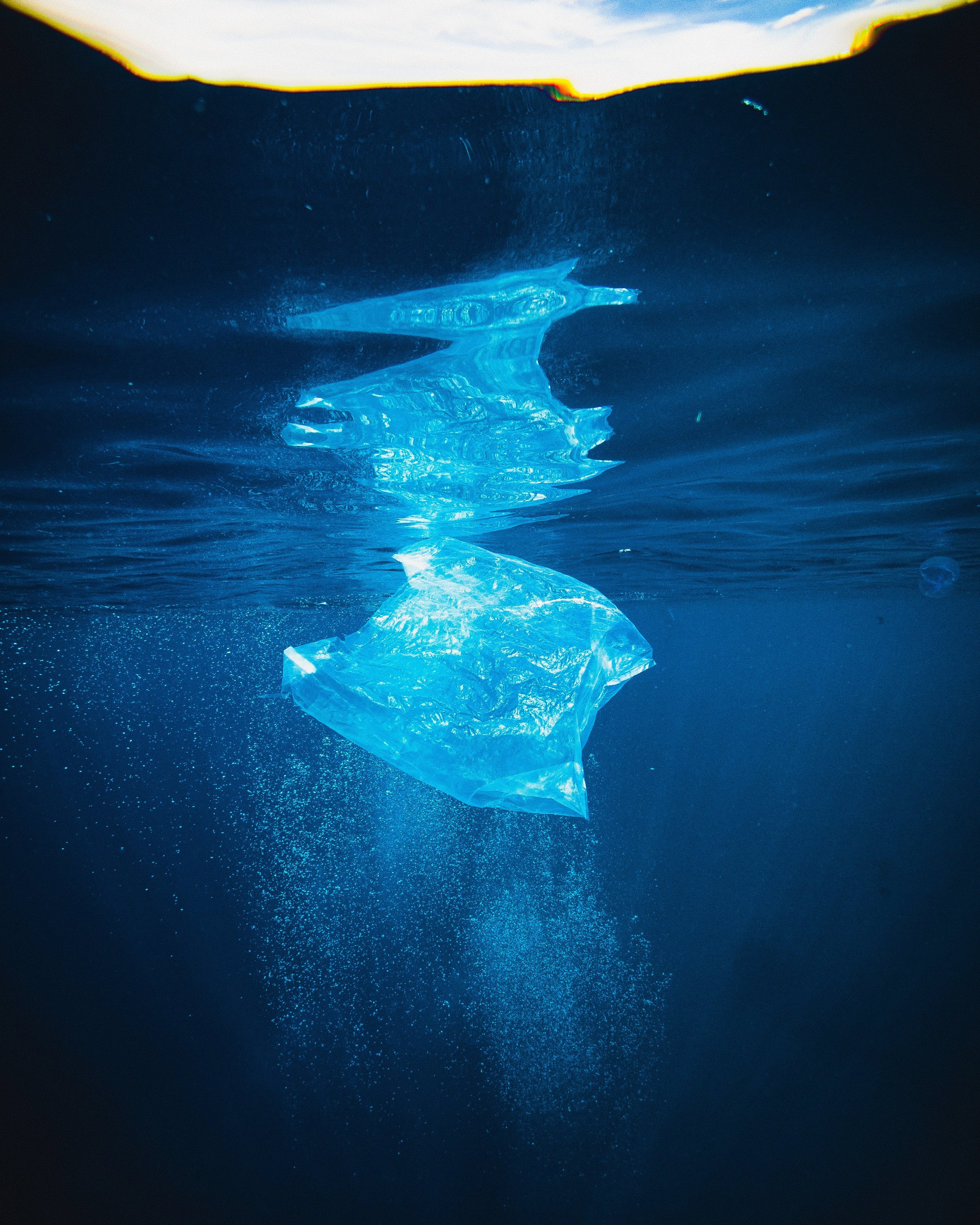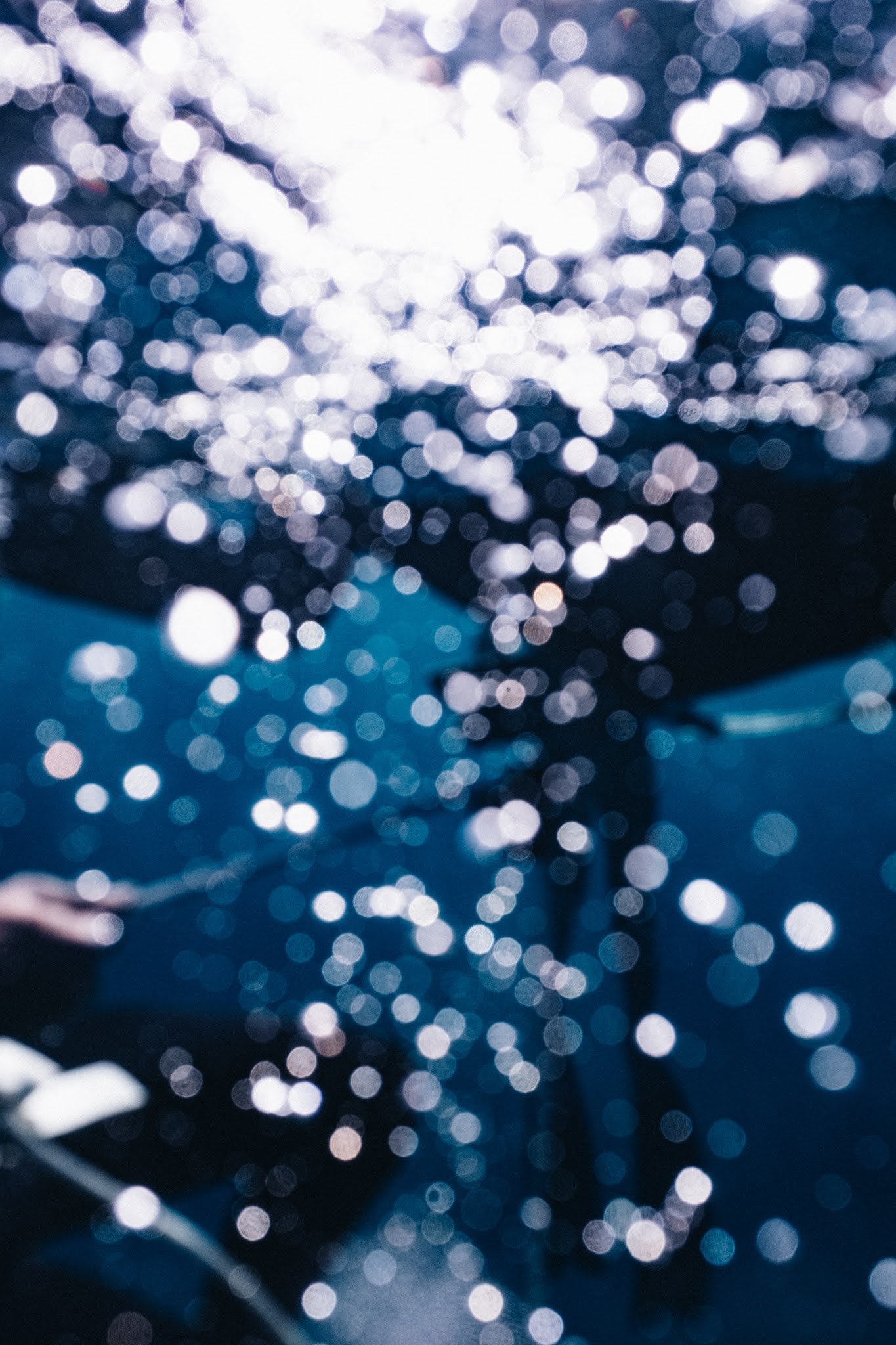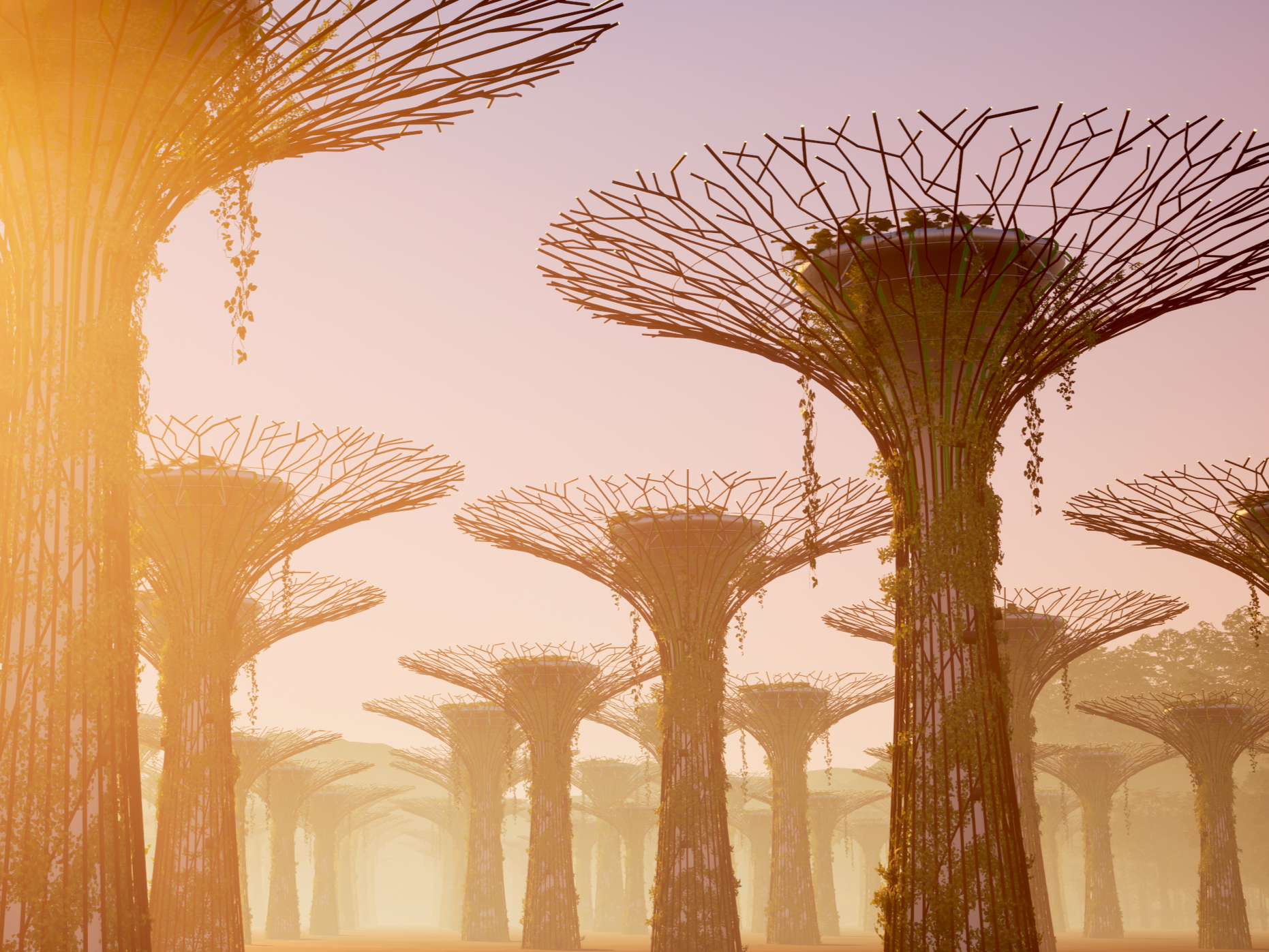Freediving To Find Peace
Exploring the practice with one newly qualified ocean explorer
Words by Farah Shafiq. Images by Nicolas Franck Pauly
The science behind mindfulness, breathwork and meditation has been given significant airtime in recent years. But, how about a practice that incorporates all of the above, and more? Something that completely immerses us within nature in active pursuit of wellbeing, and supports environmental conservation? Enter freediving.
When freediving, the process can be similar to that of meditation. The diver allows the mind to settle and observes the breath, which leads to a drop in metabolic rate, plus changes in stress chemistry and brain function. There’s an increase in oxygen and blood flow to the prefrontal cortex (the area involved in clear decision-making) and a rise in alpha brain waves (characteristic of reduced mental activity and relaxation). Once underwater, the Mammalian Dive Response (MDR) is activated, one of the body’s dormant responses that allows for longer breath holds at depth.
Not only are the far-reaching benefits felt in the body, but the connection to our environment goes hand in hand with the practice.
Freediving can facilitate underwater research and marine conservation; freediver Guillaume Néry is just one example, working with the organisation Coral Gardeners to ensure we don’t lose over 90% of the world’s coral reefs by 2050 (the current projection, without immediate climate intervention).
Freediving also builds community. Look to the haenyeo or ‘sea women’ of South-Korea’s Jeju Island, who have been freediving for seaweed and shellfish since the 17th century. “[These] women dive down to get food from the sea and sustain their whole community,” says Hawaii-based professional freediver Kimi Werner, who met the women for a short film documenting their practice and motherhood by Patagonia, Lessons From Jeju.
“The coral reef is doing its best to survive, you can feel it,” photographer, designer and recently qualified freediving instructor Nicolas Franck Pauly tells Looms, with optimism. Freediving has been a life changing experience for him in the last two years. Speaking to us from his current base in Mysore, India, he shares his love of freediving, its myriad benefits and some of the best places in the world to do it.
What initially drew you to freediving? What was your first experience like?
My fascination with freediving started after watching Le Grand Bleu, a 1988 film with some breathtaking underwater shots, directed by Luc Besson. I have watched it countless times – every six months I became obsessive, watching the movie a few times, accompanied by every YouTube video and documentary on the topic I could find.
My first experience of freediving was pure serendipity. I was looking for a way to get out of the party scene in London. I suggested to my two ‘rave’ friends that we leave the city for a few days and just do nothing. We booked flights for Menorca, but my friends dropped out to go to a party instead. I went – and, alone on the island, googled “activities in Menorca”. Freedive Menorca caught my eye.
It was during the summer of 2020, so not many people were travelling and I was the only student on the course. With plenty of time, I did my first training and loved it. The first time I went below 12m-depth – when my buoyancy was the same as water – it felt like I became one with the ocean. The experience brought me to tears.
On the way home, I booked my return flight to Menorca immediately.
How do your yoga and freediving practices compliment each other?
I started yoga in late 2019, but it really came into its own for me during the pandemic.
For me, that time was very introspective. Everything I did was to deepen my personal, spiritual practice, and Ashtanga helped me to do this. It has instilled in me dedication and discipline, both qualities that I also apply to freediving.
The two practices are extremely linked – yoga helps with the physical skill of diving, for example flexibility in the chest and control of breathing. In turn, the breath holds in freediving are a way of expanding the mind, which links back to the spiritual element.
Being in and around the ocean more often, do you feel a deeper awareness of the climate issues we’re currently facing?
Very much so, yes. I meet a lot of teachers and students who are all concerned and active in various ways. We see a lot of plastic pollution, in particular. But, the coral reef is doing its best to survive, you can feel it.
I agree with the mindset and approach of eco-adventurers like Julien Moreau, in that adventure is a powerful way to positively influence the world. Moreau hopes his eco-adventures will influence policies, support environmental NGOs and help create a generation of eco-citizens. It’s an inspiring approach that those of us with the spirit for adventure can take a lot from.
How do you prepare for a dive?
The preparation starts the night before, limiting food intake (or in some cases, fasting completely). I tend to eat lots of grains and nuts, cut out sugar, gluten and alcohol – with the aim of limiting any mucus inhibitors.
On the day of the dive, I wake up around 6am, do a few stretches and eat a few cashews. Then, I’ll jump in the van and say good morning to my friends as we head down to the diving spot. We’re all pretty relaxed, trying to maintain that just-out-of-sleep state.
Once there, I do half an hour of gentle yoga stretching; there isn’t enough time for my usual full Ashtantga practice, which typically takes about 90 minutes. I might also throw in 10-minutes of handstand practice, to get the blood flow going.
At the water’s edge, I start some breathing exercises, expanding and emptying the lungs. Then, once in the water, I do a triangular then quadratic breathing exercise, and finally a deep yogic breath.
Once out of the water, we have a warm tea and allow our bodies to recalibrate.
How does it feel when you’re diving?
It feels great, immensely great. The last breath taken, the retention, the depth, the descent – every moment has its own charm and fascination. For me, the best is the free fall, when you reach the point of negative buoyancy. Then you can stop swimming downward, allowing the force of gravity alone to draw you deeper. It’s the embodiment of letting go.
How has your time underwater transformed your life on dry land?
Since starting freediving, I’m generally in much better health. My nutrition has improved, my breathing is better, I’m physically stronger and more flexible, and my sense of spirituality has deepened too. I find I can manage my stress and anxiety much better – the moment I put my head underwater, I stop thinking about everything else. So, I channel that sense of calm on dry land. And, freediving also brings with it a nice social group.
Have you come across any mental blocks as you’ve progressed?
The most challenging aspect for me is definitely the duration of long static holds under water. When I was training to become an instructor, this was the element I struggled with the most. But, while it was the least pleasant of all the tests for me, it turned out to be a really powerful moment.
It consisted of a relaxation phase, followed by a breath hold of four minutes. I rarely train this way (I usually train depth, rather than static holds), so my preparation was all over the place. It took me four attempts to smash it. It was a challenge against my inner voice, which urged me to surface on every previous attempt.
The key to this achievement was finding relaxation in distraction, tapping into the meditative aspect. For the first time, I kept my eyes open and observed my surroundings, the underwater sounds, the warmth of the sun… And, it worked!
What would you say to those who view freediving as an ‘extreme sport’?
It’s actually the polar opposite! There’s no adrenaline here, otherwise you can’t dive. Freediving is closer to meditation than anything else – it requires that fine balance of control and calmness.
Are there any pioneering freedivers we should look up?
Jacques Mayol was a pioneer freediver, devoting his life to the development of breath holds underwater as a safe sport. He came across yoga and pranayama in 1950s Stockholm, when visiting as a young man. And later, he picked up the seated meditation practice of Zazen in Japan. He became a daily practitioner of all three disciplines.
There are accounts from his brother, who remembers seeing Jacques practise in the bow of the boat every morning before his freediving sessions – wearing nothing but his French moustache and blue speedos. As a fellow Frenchman, he’s an inspiration for me!
I’m also hugely inspired by world-record holding freediver Willian Trubridge; and James Nestor, the award-winning science journalist who travels the world to find out what went wrong in our evolution of breathing — and how to fix it.
And, you should watch the short-film One Breath Around The World, featuring the freediver you mentioned in the introduction to this article, Guillaume Néry. It’s beautiful.
Where are the best places in the world that freediving has taken you?
So far: Dahab in Egypt, where I did my instructor qualification with Catherine at Freediving Tribe Dahab; Menorca, where I first fell in love with freediving thanks to Freedive Menorca; and Cenotes in Mexico, which has some incredible diving opportunities. I’m excited for all the places to come.



